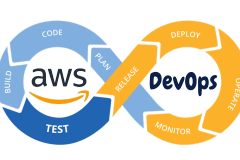Learn DevOps with Linux, YAML, Git, Jenkins, Docker, Kubernetes, Ansible, Terraform, Grafana, Prometheus, ECS, ECR, EKS and other DevOps tools.
DevOps Course Highlights
- 50 hours of instructor-led training
- 16 hours of project work
- 6 hours of assessments
- 1 year of learning support
- Certificate
- Job assistance
Course Curriculum
1. Introduction to DevOps
2. Linux essentials
3. Git Version Control
4. Jenkins CI/CD Pipeline
5. Docker Containers
6. Kubernetes Container Orchestration
7. Ansible Configurations
8. Terraform
9. Monitoring with Grafane, Prometheus and Splunk
10. AWS Cloud Devops tools ECS, ECR and EKS
DevOps is a combination of practices and tools that an organization follows to deliver applications and services at high velocity. DevOps helps an organization evolve and improve products at a faster pace.
Docker is an open source container platform. It Is Used To Create, Test And Deploy Applications. We Can Package An Application With Related Dependencies Such As Libraries And Configurations With Docker Containers. This Enables The Application To Reliably Run On Any Computing Environment. Our Hands-On Docker Training Sessions Will Provide a deep Understanding Docker Containers.
Jenkins Is An Open Source Automation Server. It Helps In Automating Activities Like Build, Test, Package, Deployment. It Is A Key Part Of DevOps Toolkit Because It Enables Teams To Build CI/CD Pipelines.
Git Is A Distributed Version Control System. It Is Very Popular And Widely Used For Tracking Changes In Source Code During Software Development. Programmers Can Coordinate As Well As Track Changes In Any Set Of Files. Git Aims At Data Integrity And Support For Distributed Workflows.
Kubernetes Is Open Source Container Orchestration Tool. One Can Discard All The Manual Processes Required In Deploying And Scaling Of The Containers With Kubernetes. Kubernetes Is Very Useful Environment Where Microservices Architecture Is Predominant.
Ansible Is A Configuration Management Tool. It Is An Open Source And Can Help In Improving The Reliability, Consistency And Quality Of IT Infrastructure. Ansible Can Also Help In Provisioning Infrastructures Depending On Requirements.













